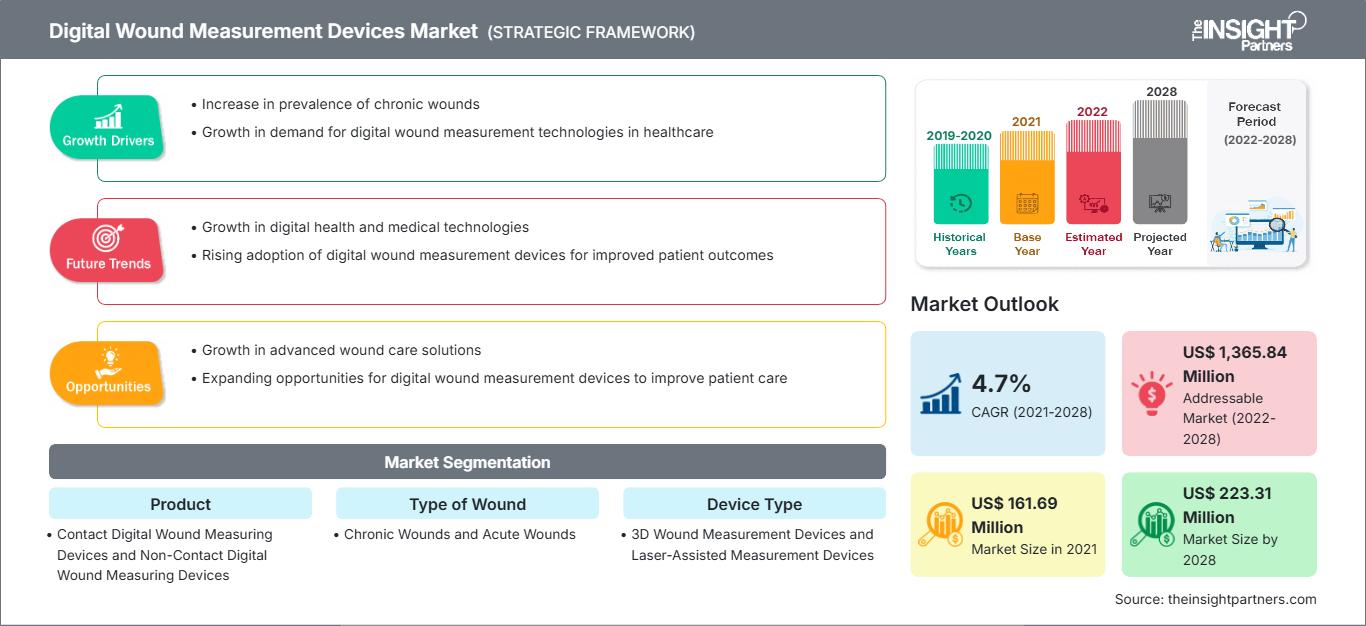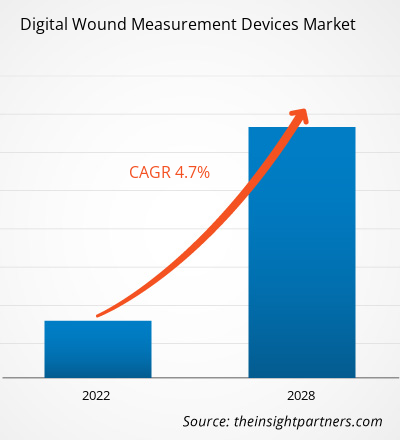[연구 보고서] 디지털 상처 측정 장치 시장은 2021년 1억 6,169만 달러에서 2028년 2억 2,331만 달러로 성장할 것으로 예상되며, 2021년부터 2028년까지 연평균 4.7% 성장할 것으로 예상됩니다.
디지털 상처 측정 장치 시장은 제품, 상처 유형, 응용 분야, 장치 유형, 최종 사용자 및 지역을 기준으로 세분화됩니다. 지역별로 디지털 상처 측정 장치 시장은 북미, 유럽, 아시아 태평양, 중동 및 아프리카, 중남미로 크게 구분됩니다. 본 보고서는 시장 동향, 기술 발전, 시장 역학과 같은 주요 지표와 주요 시장 참여자들의 경쟁 환경 분석을 중심으로 시장에 대한 심층적인 통찰력을 제공합니다.
요구 사항에 맞게 이 보고서를 사용자 정의하십시오.
이 보고서의 일부, 국가 수준 분석, Excel 데이터 팩을 포함하여 모든 보고서에 대한 사용자 정의를 무료로 받을 수 있을 뿐만 아니라 스타트업 및 대학을 위한 훌륭한 제안 및 할인을 이용할 수 있습니다
디지털 상처 측정 장치 시장: 전략적 통찰력

-
이 보고서의 주요 주요 시장 동향을 확인하세요.이 무료 샘플에는 시장 동향부터 추정 및 예측에 이르기까지 데이터 분석이 포함됩니다.
시장 분석
궤양 발생률 증가는 시장 성장에 크게 기여
건강에 해로운 생활 습관, 음주, 흡연 증가는 비전염성 질환 유병률 증가에 기여합니다. 예를 들어, 2018년 세계보건기구(WHO)는 전 세계 18세 이상 성인의 13%가 비만이라고 발표했습니다. 미국은 비만 유병률이 가장 높으며(약 42.4%), 사우디아라비아, 터키, 이집트, 리비아, 이란, 이라크, 남아프리카공화국, 캐나다, 멕시코, 호주, 그리고 여러 남미 및 유럽 국가가 그 뒤를 따릅니다. 또한, 당뇨병은 2018년 기준으로 3,420만 명의 미국 시민(인구의 10.5%)에 영향을 미쳤습니다.전당뇨병은 8,800만 명의 사람들에게 영향을 미치며, 치료하지 않으면 5년 이내에 2형 당뇨병(T2D)으로 진행될 수 있습니다.당뇨병은 18~44세의 약 4.2%, 45~64세 성인의 약 17.5%, 65세 이상의 약 26.8%에 영향을 미칩니다.따라서 당뇨병성 족부 궤양 및 압박 궤양과 같은 당뇨병 관련 위험이 증가함에 따라 디지털 상처 측정 장치 시장 규모가 커지고 있습니다.게다가 당뇨병성 족부 궤양(DFU)과 같은 당뇨병과 관련된 합병증도 고급 상처 관리 제품에 대한 필요성을 촉진하고 있습니다.예를 들어, 국제 당뇨병 연맹에 따르면 당뇨병 환자는 하지 절단이 필요할 가능성이 15~40배 더 높습니다.절단의 약 85%는 신경병성 족부 궤양이 발생합니다. 따라서 이러한 요인들이 예측 기간 동안 디지털 상처 측정 장치에 대한 수요를 견인하고 있습니다.
제품 기반 인사이트
제품 유형에 따라 디지털 상처 측정 장치 시장은 비접촉식 디지털 상처 측정 장치와 접촉식 디지털 상처 측정 장치로 나뉩니다. 2021년에는 기술 발전과 상처의 표면적 및 부피를 측정하는 효과적이고 비접촉식 방식 덕분에 비접촉식 디지털 상처 측정 장치 부문이 시장 점유율을 크게 확대했습니다.
상처 기반 인사이트 유형
상처 유형에 따라 디지털 상처 측정 장치 시장은 만성 상처와 급성 상처로 나뉩니다. 만성 상처는 욕창(PU), 당뇨병성 족부 궤양(DFU), 정맥 하지 궤양(VLU), 동맥 궤양으로 세분됩니다. 급성 상처는 화상 및 외상 및 수술 상처. 만성 상처 부문은 2021년 시장 점유율이 더 높았습니다. 이는 욕창, 당뇨병성 족부 궤양, 정맥 하지 궤양, 동맥 궤양과 같은 만성 상처의 발생률 증가에 기인합니다.
기기 유형 기반 분석
기기 유형에 따라 디지털 상처 측정 기기 시장은 3D 상처 측정 기기와 레이저 보조 측정 기기로 구분됩니다. 레이저 보조 상처 측정 기기 부문은 2021년 시장 점유율이 더 높았으며, 예측 기간 동안 시장에서 더 높은 CAGR을 기록할 것으로 예상됩니다.
응용 분야 기반 분석
응용 분야를 기준으로 디지털 상처 측정 기기 시장은 상처 관리, 사지 보존, 재건 수술로 세분화됩니다. 상처 관리 부문은 혈액 관류, 고압 산소 요법, 조직 생존력 등으로 더 세분화됩니다. 만성 상처 부문은 2021년 디지털 상처 측정 장치 시장에서 가장 큰 점유율을 차지했습니다. 그러나 상처 관리 부문은 예측 기간 동안 디지털 상처 측정 장치 시장에서 가장 높은 CAGR을 기록할 것으로 예상됩니다.
최종 사용자 기반 인사이트
최종 사용자를 기준으로 디지털 상처 측정 장치 시장은 병원 및 진료소와 지역 사회 센터로 구분됩니다. 병원 및 진료소 부문은 2021년 디지털 상처 측정 장치 시장에서 더 큰 점유율을 차지했으며, 예측 기간 동안 디지털 상처 측정 장치 시장에서 더 높은 CAGR을 기록할 것으로 예상됩니다.
제품 출시, 인수합병은 글로벌 디지털 상처 측정 장치 시장 참여자들이 적극적으로 채택하는 전략입니다. 최근 주요 시장 동향은 다음과 같습니다.
2021년 9월, Kent Imaging은 캐나다 보건부의 SnapshotNIR V3.0(KD204) 승인을 발표했으며, 이제 두 공식 언어로 배송이 가능합니다. 이 업그레이드는 급성 및 만성 상처의 조직 평가를 발전시키는 영상 기술에 중요한 기능 향상을 제공합니다.
디지털 상처 측정 장치 - 시장 세분화
제품에 따라 디지털 상처 측정 장치 시장은 접촉식 디지털 상처 측정 장치와 비접촉식 디지털 상처 측정 장치로 나뉩니다. 상처 유형에 따라 시장은 만성 상처와 급성 상처로 나뉩니다. 만성 상처 부문은 압박 궤양(PU), 당뇨병성 족부 궤양(DFU), 정맥 하지 궤양(VLU), 동맥 궤양으로 세분됩니다. 급성 상처 부문은 화상 및 외상 및 수술 상처. 디지털 상처 측정 장치 시장은 기기 유형에 따라 3D 상처 측정 장치와 레이저 보조 측정 장치로 구분됩니다. 응용 분야에 따라 디지털 상처 측정 장치 시장은 상처 관리, 사지 보존, 재건 수술로 세분화됩니다. 상처 관리 분야는 혈액 관류, 고압 산소 요법, 조직 생존율 등으로 더 세분화됩니다. 최종 사용자에 따라 디지털 상처 측정 장치 시장은 병원 및 진료소와 지역 사회 센터로 구분됩니다. 지리적 위치에 따라 시장은 주로 북미, 유럽, 아시아 태평양, 중동 및 아프리카, 중남미로 구분됩니다.
디지털 상처 측정 장치 시장 지역별 통찰력
The Insight Partners의 분석가들은 예측 기간 동안 디지털 상처 측정 장치 시장에 영향을 미치는 지역별 동향과 요인을 면밀히 분석했습니다. 이 섹션에서는 북미, 유럽, 아시아 태평양, 중동 및 아프리카, 그리고 중남미 지역의 디지털 상처 측정 장치 시장 부문 및 지역별 현황도 다룹니다.
디지털 상처 측정 장치 시장 보고서 범위
| 보고서 속성 | 세부 |
|---|---|
| 시장 규모 2021 | US$ 161.69 Million |
| 시장규모별 2028 | US$ 223.31 Million |
| 글로벌 CAGR (2021 - 2028) | 4.7% |
| 이전 데이터 | 2019-2020 |
| 예측 기간 | 2022-2028 |
| 다루는 세그먼트 |
By 제품
|
| 포함된 지역 및 국가 |
북미
|
| 시장 선도 기업 및 주요 회사 프로필 |
|
디지털 상처 측정 장치 시장 참여자 밀도: 비즈니스 역학에 미치는 영향 이해
디지털 상처 측정 기기 시장은 소비자 선호도 변화, 기술 발전, 그리고 제품 효능에 대한 인식 제고 등의 요인으로 인한 최종 사용자 수요 증가에 힘입어 빠르게 성장하고 있습니다. 수요가 증가함에 따라 기업들은 제품 라인업을 확장하고, 소비자 니즈를 충족하기 위한 혁신을 추진하며, 새로운 트렌드를 적극 활용하고 있으며, 이는 시장 성장을 더욱 가속화하고 있습니다.

- 을 얻으세요 디지털 상처 측정 장치 시장 주요 주요 플레이어 개요
회사 프로필
- eKare Inc.
- Kent Imaging Inc.
- WoundMatrix Inc.
- Perceptive Solutions
- WoundVision
- Aranz Medical Ltd.
- Tissue Analytics
- Fuel 3D Technologies Ltd.
- Hitachi Aloka Medical America Inc.
- MolecuLight Inc.
- 과거 분석(2년), 기준 연도, CAGR을 포함한 예측(7년)
- PEST 및 SWOT 분석
- 시장 규모 가치/거래량 - 글로벌, 지역, 국가
- 산업 및 경쟁 환경
- Excel 데이터세트
최근 보고서
관련 보고서
사용 후기
구매 이유
- 정보에 기반한 의사 결정
- 시장 역학 이해
- 경쟁 분석
- 고객 인사이트
- 시장 예측
- 위험 완화
- 전략 기획
- 투자 타당성 분석
- 신흥 시장 파악
- 마케팅 전략 강화
- 운영 효율성 향상
- 규제 동향에 발맞춰 대응






















 무료 샘플 받기 - 디지털 상처 측정 장치 시장
무료 샘플 받기 - 디지털 상처 측정 장치 시장